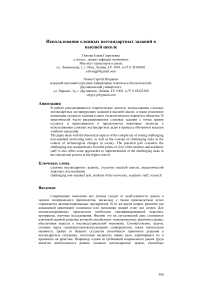Использование сложных нестандартных заданий в высшей школе
Автор: Попова Елена Георгиевна, Попов Сергей Игоревич
Журнал: Образовательные технологии и общество @journal-ifets
Статья в выпуске: 3 т.21, 2018 года.
Бесплатный доступ
В работе рассматриваются теоретические аспекты использования сложных нестандартных мотивирующих заданий в высшей школе, а также изменение концепции сложного задания в свете технологических перемен в обществе. В практической части рассматриваются сложные задания с точки зрения студента и преподавателя и предлагаются некоторые подходы к использованию сложных нестандартных задач в процессе обучения в высшем учебном заведении.
Сложное нестандартное задание, студенты высшей школы, академический персонал, исследование, сhallenging non-standard task
Короткий адрес: https://sciup.org/140224596
IDR: 140224596
Список литературы Использование сложных нестандартных заданий в высшей школе
- Choppin, J. The role of local theories: Teacher knowledge and its impact on engaging students with challenging tasks//Mathematics Education Research Journal. -University of Rochester, 2011. -P. 5-25.
- City, E. A., Elmore, R. F., Fiarman, S. E., & Teitel, L. Instructional rounds in education//Journal of Mathematics, Teacher Education. -Cambridge, MA: Harvard Educational Press, 2009. -P. 1-18.
- Confrey, J., Maloney, A. P., & Corley, A. K. Learning trajectories: A framework for connecting standards with curriculum//ZDM. -The International Journal on Mathematics Education, 2014. -46(5). -P. 719-733.
- Hiebert, E. Core. Vocabulary and Тhe Challenge of Complex Text//TextProject & University of California, Santa Cruz, 2014.
- Hiebert, J., et al. Teaching mathematics in seven countries: Results from the TIMSS 1999 Video Study//Washington, DC: National Centre for Education Statistics, U.S. Department of Education, 2003.
- Marshall, J., Horton, R. The Relationship of Teacher Facilitated, Inquiry Based Instruction to Student Higher Order Thinking//School Science and Mathematics, 2011. -111(3). -P. 93-101.
- Middleton, J. A., & Jansen, A. Motivation matters and interest counts//Reston, VA: National Council of Teachers of Mathematics, 2011.
- Pei-Jung Wang, Hua-Fang&Morgan, G. The Revised Individualised Moderately Challenging Mastery Tasks for 15-to 48-month-old Children//Hungarian Educational Research Journal, 2017. -Vol.7(2). -P. 68-85.
- Popova, Y. Challenging Tasks: Problems of Implementation//Actual Problems of Education, 2018.
- Preenen, P., Annelies van Vianen, A., de Pater, I. Challenging tasks: The role of employees' and supervisors' goal orientations//European Journal of Work and Organizational Psychology, 2012. -23(1). -P.1-14.
- Russo, J. How challenging tasks optimise cognitive load//Proceedings of the 39th Psychology of Mathematics Education Conference -Australia, 2015 -4: 105-112.
- Russo, J. Teaching with challenging tasks: Two 'how many' problems//Prime Number, 2015 -30(4), P. 9-11.
- Schoenfeld, A. The math wars//Educational Policy, 2004. -18(1). -P. 253-286.
- Stein, M. K., & Lane, S. Instructional tasks and the development of student capacity to think and reason: An analysis of the relationship between teaching and learning in a reform mathematics project//Educational Research and Evaluation, 1996. -2(1). -P. 50-80.
- Sullivan, P, Mornane, A. Exploring teachers’ use of, and students’ reaction to, challenging mathematical tasks//Mathematics Education research Journal, 2013. -25. -P. 1-21.
- Sullivan, P., Clarke, D., & Clarke, B. Teaching with tasks for effective mathematics learning//New York: Springer, 2013.
- Sullivan, P., Clarke, D., Clarke, B., & O’Shea, H. Exploring the relationship between teacher actions and student learning//In M. Tzekaki, M. Kaldrimidou, & H. Sakonidis (Eds.), Proceedings of the 33rd conference of the International Group for the Psychology of Mathematics Education -Thessaloniki: PME. -2009. -Vol. 5. -P. 185-193.
- Sullivan, P., Clarke, D., Cheeseman, J., Mornane, A., Roche, A., Sawatzki, C. & Walker, N. Students’ willingness to engage with mathematical challenges: Implications for classroom pedagogies/J. Anderson, M. Cavanagh, A. Prescott//Australia: Mathematics Education Research Group of Australasia. -2014 -P. 597-604.
- Sullivan, P., et al. Supporting Teachers in Structuring Mathematics Lessons Involving Challenging Tasks//Journal of Mathematics Teacher Education. -2014. -18(2). -P.123-140.
- Sullivan, P., Mousley, J., & Zevenbergen, R. Increasing access to mathematical thinking//The Australian Mathematical Society Gazette. -2005. -32(2). -P. 105-109.
- Vincent, J., & Stacey, K. Do mathematics textbooks cultivate shallow teaching? Applying the TIMSS video study criteria to Australian eighth-grade textbooks//Mathematics Education Research Journal. -2008. -20(1). -P. 82-107.
- Попова, Е., Попов, С. Высшие учебные заведения -ориентируемся на клиента или на продукт//Образовательные технологии и общество. -2017. -Т. 20, № 3. -С.430-442.
- Фрумкин, К. Клиповое мышление и судьба линейного текста. . -Режим доступа: URL: http://nounivers.narod.ru/ofirs/kf_clip.htm (дата обращения: 27.03.18).


